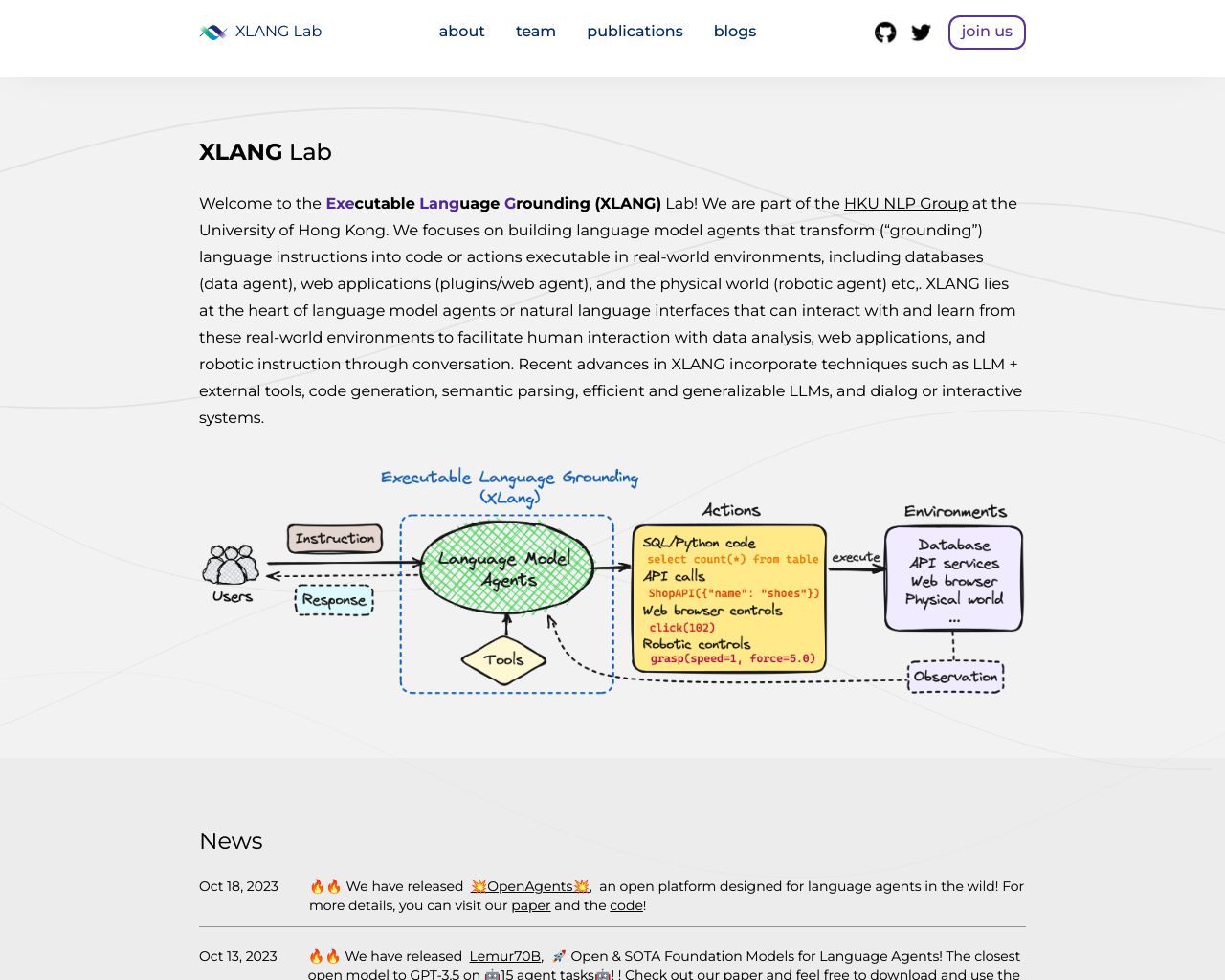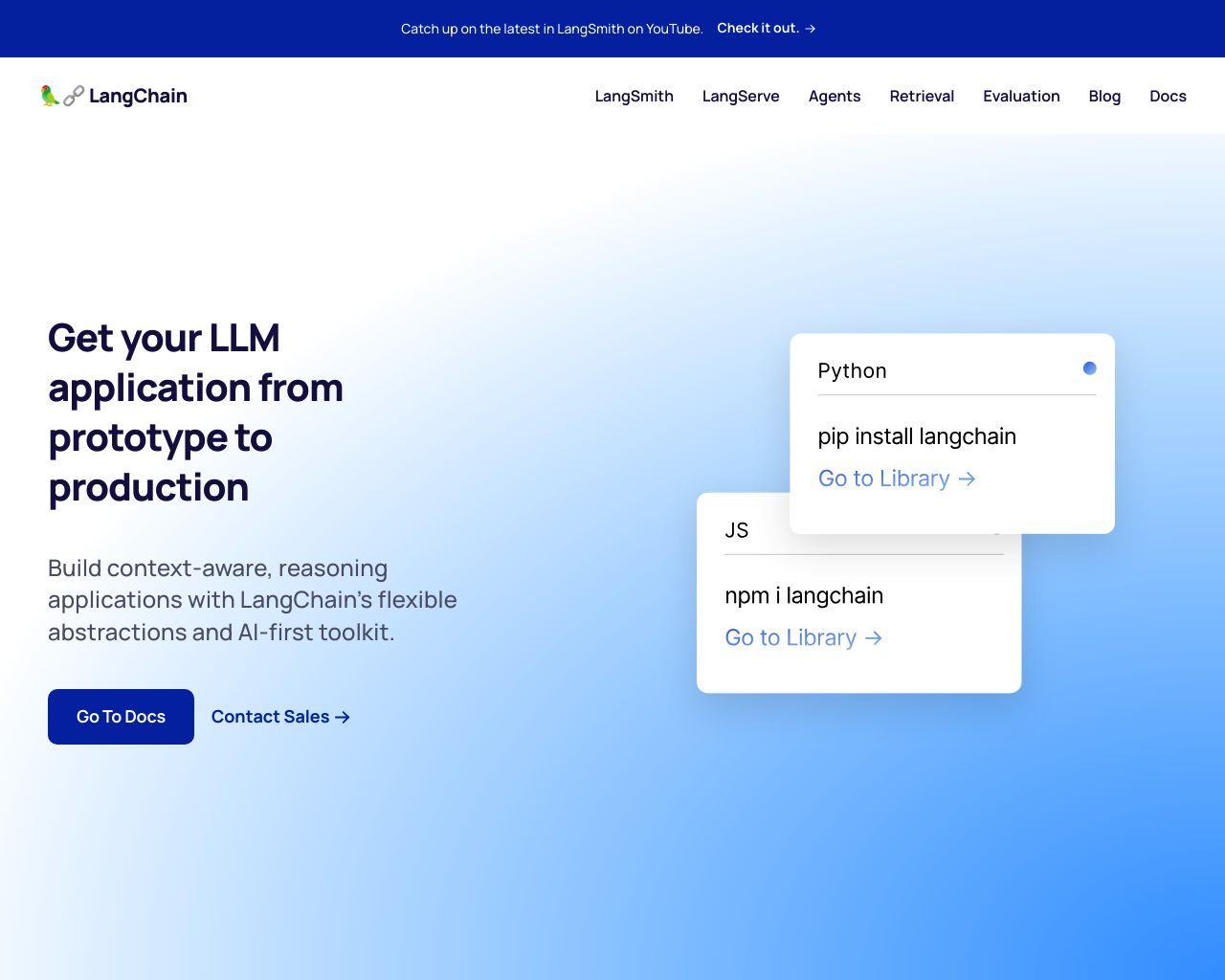Artificial intelligence reshapes business landscapes, demanding powerful yet accessible solutions. Our comparison of OpenAgents and LangChain unveils two distinct approaches to AI development. OpenAgents offers specialized agents for data analysis, task automation, and web interaction, while LangChain provides a flexible framework for custom LLM applications. We examine their core components, security features, and overall utility to help you choose the right platform for your AI needs. Whether you’re a developer seeking granular control or a business user looking for streamlined solutions, this analysis equips you with the knowledge to make an informed decision in the rapidly evolving world of AI tools.
OpenAgents Overview
OpenAgents offers an open-source platform for creating, hosting, and managing AI agents. The platform centers around three main agent types: Data Agent for complex data analysis, Plugins Agent with over 200 integrated tools, and Web Agent for autonomous web browsing.

OpenAgents excels in data processing, task automation, and web interaction. The Data Agent efficiently handles large datasets, generating insights for marketing and other data-intensive roles. The Plugins Agent adapts to various user needs, from checking weather to online shopping. The Web Agent, equipped with a Chrome extension, streamlines internet navigation and information retrieval.
OpenAgents excels in data processing, task automation, and web interaction. The Data Agent efficiently handles large datasets, generating insights for marketing and other data-intensive roles.
The platform emphasizes user-friendliness with a web UI and backend server for easy agent communication. It supports both development and production environments, allowing users to test and deploy agents in different settings. OpenAgents provides debugging capabilities and detailed logs for troubleshooting and understanding agent decisions.
While OpenAgents offers powerful features, it lacks some advanced capabilities. The platform doesn’t include a visual builder or no-code editor, requiring some coding knowledge for agent creation. It also doesn’t support multimodal inputs or multi-agent collaboration. However, its strengths in data analysis, plugin integration, and web automation make it a valuable tool for developers and businesses seeking to leverage AI for specific tasks.
LangChain Overview
LangChain provides an open-source framework for building applications powered by large language models (LLMs). The platform offers developers tools to create, deploy, and manage AI agents across various use cases.
LangChain’s framework includes components for LLM integration, prompt management, memory handling, and task execution. Developers can leverage these building blocks to construct sophisticated AI agents capable of reasoning, decision-making, and completing complex tasks. The modular architecture allows for customization and extension to suit specific application needs.
LangChain provides an open-source framework for building applications powered by large language models (LLMs). The platform offers developers tools to create, deploy, and manage AI agents across various use cases.

Key features of LangChain include LangGraph for building stateful agents, LangSmith for debugging and monitoring, and LangServe for deploying chains as APIs. The platform supports integration with popular LLM providers and offers tools for retrieval-augmented generation, structured output parsing, and streaming. While powerful, LangChain requires programming knowledge and lacks a visual builder or no-code options.
LangChain excels at providing flexibility and control for developers comfortable with code. However, it may present a steeper learning curve for non-technical users compared to more visual agent builders. The open-source nature allows for community contributions but can lead to fragmentation. Enterprise support options are limited compared to some commercial platforms.
LangChain excels at providing flexibility and control for developers comfortable with code. However, it may present a steeper learning curve for non-technical users compared to more visual agent builders.
For organizations seeking to leverage LLMs in applications, LangChain offers a robust foundation. Its modular approach enables rapid prototyping and customization. However, production deployment and scaling may require additional engineering effort compared to fully-managed solutions. LangChain continues to evolve rapidly, driven by its active open-source community.
Feature Comparison
OpenAgents and LangChain offer distinct approaches to AI agent development, with notable differences in their core components and security features. OpenAgents provides a robust platform centered around three specialized agents: Data Agent, Plugins Agent, and Web Agent. These agents excel in data analysis, task automation, and web interaction respectively. LangChain, in contrast, offers a more flexible framework for building custom AI applications using large language models.
In terms of core components, LangChain’s modular architecture allows for greater customization, providing developers with tools like LangGraph for building stateful agents and LangSmith for debugging and monitoring. OpenAgents lacks this level of modularity but offers a more streamlined experience with its pre-configured agents. LangChain’s approach requires more technical expertise but provides greater flexibility for complex use cases.
Security features present another area of divergence. While both platforms prioritize user data protection, LangChain offers more advanced options for constrained alignment and API authentication. OpenAgents focuses on ease of use and accessibility, potentially at the cost of some advanced security features. This difference highlights the trade-off between simplicity and advanced functionality that often characterizes AI development platforms.
Feature Comparison Table
| OpenAgents | LangChain | SmythOS | |
|---|---|---|---|
| CORE FEATURES | |||
| Visual Builder | ❌ | ❌ | ✅ |
| No-Code Options | ❌ | ❌ | ✅ |
| Agent Work Scheduler | ❌ | ❌ | ✅ |
| SECURITY | |||
| Constrained Alignment | ❌ | ❌ | ✅ |
| IP Control | ❌ | ❌ | ✅ |
| COMPONENTS | |||
| Zapier APIs | ✅ | ❌ | ✅ |
| Data Lakes | ❌ | ❌ | ✅ |
| DEPLOYMENT OPTIONS (EMBODIMENTS) | |||
| Deploy as Webhook | ✅ | ❌ | ✅ |
| Staging Domains | ❌ | ❌ | ✅ |
| Production Domains | ❌ | ❌ | ✅ |
| Deploy as Scheduled Agent | ❌ | ❌ | ✅ |
| DATA LAKE SUPPORT | |||
| Hosted Vector Database | ❌ | ❌ | ✅ |
| Sitemap Crawler | ❌ | ❌ | ✅ |
| YouTube Transcript Crawler | ❌ | ❌ | ✅ |
| URL Crawler | ✅ | ❌ | ✅ |
| Word File Support | ✅ | ❌ | ✅ |
Best Alternative to OpenAgents and LangChain
SmythOS stands out as a superior alternative to OpenAgents and LangChain, offering a comprehensive agentic AI automation platform that combines power with accessibility. Our solution addresses the limitations of both competitors while providing a robust set of features for creating and deploying AI agents.
Unlike OpenAgents and LangChain, SmythOS offers a visual builder and no-code options, making AI agent development accessible to users of all skill levels. This democratization of AI technology allows businesses to leverage advanced AI capabilities without extensive coding knowledge.
SmythOS offers a visual builder and no-code options, making AI agent development accessible to users of all skill levels.
We provide unparalleled flexibility in deployment options, including webhooks, staging and production domains, and scheduled agents — features noticeably absent from both OpenAgents and LangChain. This versatility ensures that SmythOS can adapt to diverse business needs and seamlessly integrate into existing workflows.
SmythOS excels in data management and security features, offering a hosted vector database, sitemap crawler, and advanced security measures like constrained alignment and IP control. These capabilities provide a secure and scalable foundation for AI agent development that surpasses the offerings of OpenAgents and LangChain.
By choosing SmythOS, users gain access to a comprehensive platform that combines ease of use with advanced features, enabling the creation of sophisticated AI agents for a wide range of applications. Our solution empowers businesses to harness the full potential of AI technology, driving innovation and efficiency across industries.
Conclusion
OpenAgents and LangChain offer powerful tools for AI development, each with unique strengths. OpenAgents excels in specialized agents for data analysis, task automation, and web interaction, providing a user-friendly experience. LangChain offers a flexible framework for custom LLM applications, appealing to developers seeking granular control.
However, SmythOS emerges as the superior choice, combining the best of both worlds. Our platform’s intuitive drag-and-drop interface and extensive integration ecosystem make AI development accessible to a broader audience. Unlike OpenAgents and LangChain, SmythOS supports multimodal inputs, multi-agent collaboration, and offers a visual builder for effortless agent creation.
SmythOS stands out with its “Create Once, Deploy Anywhere” approach, allowing seamless integration across various platforms and services. This versatility, combined with advanced features like autonomous agents, constrained alignment, and comprehensive security measures, positions SmythOS as the ideal solution for businesses seeking to harness AI’s full potential.
Experience the future of AI development with SmythOS. Explore our diverse range of AI-powered agent templates to jumpstart your projects, or create a free account to build unlimited AI agents with no time limit. Unlock the power of AI for your business and revolutionize your workflow with SmythOS – where innovation meets simplicity.